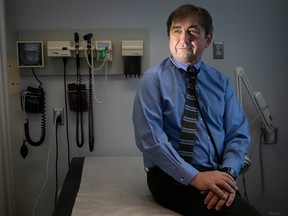“Commuting-for-health-care” phenomenon means spaces assigned to local residents are being taken up by patients from other areas.

Article content
The shortage of family doctors in Montreal seems to get little sympathy in the political hallways of Quebec City. Judging from my experience in the medical and political arenas in the past 20 years, the prevailing sentiment is that Montreal is the “spoiled child” of Quebec’s medical system. There are more health resources here per capita, including family doctors, than other regions. It has always been felt, in the halls of power of the National Assembly, that a more equitable distribution of such resources was necessary. The government started with hospital beds in the 1990s and achieved the power to distribute the specialists and family doctors in 2004.
Advertisement 2
Article content
Family doctors, in particular, are controlled by regional manpower plans (PREMs). Every June, the manpower committee (COGEM) releases its analysis of need and makes recommendations for the coming year. Relying on simplistic family doctor-to-population ratios, the committee has determined Montreal is above average compared to other areas, so much so that the health minister transferred 40 extra doctors in 2021 and 2022 from Montreal to the 450 region. The Faubourg-Plateau area of south-central Montreal is judged to have an oversupply of 26 family doctors doing primary care. As a result, this area gets fewer family doctors than retirements.
Article content
If this is the case, why do so many Montrealers complain of poor access to a family doctor? In the COGEM document, we find data that runs contrary to the committee’s conclusion, which shows there are close to 620,000 Montrealers without a family doctor and only 66 per cent of the population island-wide is registered with one, 10 per cent less than the Quebec average.
The manpower committee’s data is inaccurate because 385,000 non-Montrealers registered with family doctors in Montreal are unaccounted for in their assessment. This commuting-for-health-care population uses the spaces assigned to the local inhabitants, thus resulting in their poorer access. If spaces for family doctors were restricted to local inhabitants, registration rates in Montreal would rise to 88 per cent, according to the DRMG Montreal data.
Advertisement 3
Article content
In the sub-region of Faubourg-Plateau, more than half the registered patients — 68,000 — come from another region, thus taking away spots for the local population. As a result only 57 per cent are registered with a family doctor and 57,000 local inhabitants are left without one, COGEM’s Montreal numbers show.
According to the manpower committee documents, the registration rates for Montreal and its central regions are worsening every year.
Even more worrisome is that the same principles are being applied to specialist care and hospital beds. Both are also being assigned to regions based on inhabitant population without consideration of the many patients who come from outside their area, thus reducing Montrealers’ access to these other medical services.
Unfortunately, despite being aware of this inequitable situation, no provincial party seems willing to take on the problem, presumably for fear of political repercussions from mainland Quebec. A legal challenge to this situation — of which I was a part — failed in both provincial superior and appellate courts. However, we feel those decisions were flawed, and an application to the Supreme Court is in process.
Advertisement 4
Article content
Montreal Island residents make up almost 25 per cent of the Quebec population, pay a significant part of its tax base and receive less-than-average access to health-care services. Some are forced to go to private clinics for their primary health care and their surgeries. Montrealers have a right to demand corrections to this situation.
While Montrealers wait for a fair resolution for their disadvantaged access, one interesting and immediate solution would be for the government to compensate for the use of private medical services.
Another idea: Former MNA Robert Libman has on several occasions called for more autonomy for Montreal in our political system. Given the state of Montreal’s medical system, that would be an interesting solution. Forget Santé Québec; how about Santé Montréal?
Dr. Mark Roper is director of the QE Medical Group and an assistant professor at McGill University.
Recommended from Editorial
Advertisement 5
Article content
Article content






